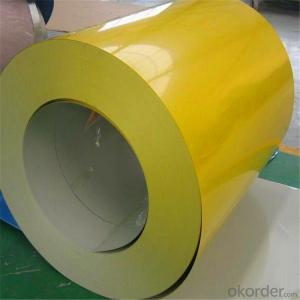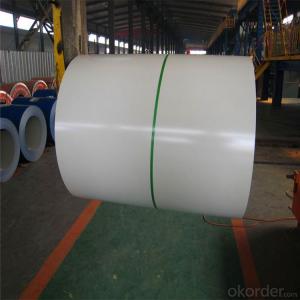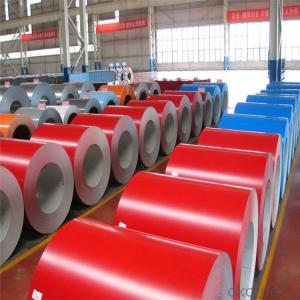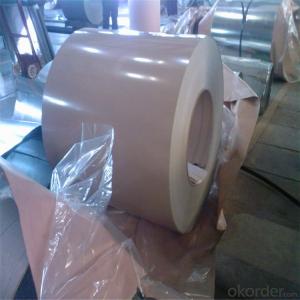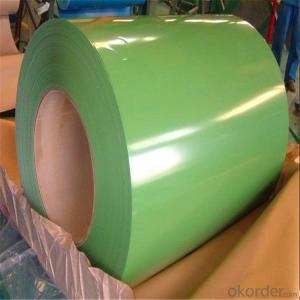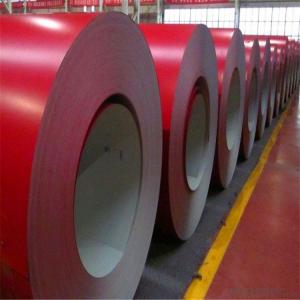Ppgl Color Coated Galvanized Steel Sheet in Coils
- Loading Port:
- Tianjin
- Payment Terms:
- TT or LC
- Min Order Qty:
- 25 m.t.
- Supply Capability:
- 5000 m.t./month
OKorder Service Pledge
OKorder Financial Service
You Might Also Like
Item specifice
Ppgl Color Coated Galvanized Steel Sheet in Coils
Description of Ppgl Color Coated Galvanized Steel Sheet in Coils
Product | PPGI/PPGL |
Capacity | 5,000 tons/month |
Base material | Hot dipped galvanized steel |
Thickness | 0.2-2.0mm |
Width | 600-1250mm(according to your need) |
Coil Weight | 3-6tons |
Quality | SGCC, DX51D |
Color | RAL No. or customers samples’ color |
Zinc-coating | 30g/m2-180g/m2 |
Coil ID | 508mm/610mm |
Technique | Cold rolled—hot dipped galvanized—color coated |
Painting | Top painting:15~25μm |
Back painting: 6~10μm | |
Tolerance | Thickness: +/-0.02mm |
Width:+/-2mm | |
Shipment time | within 15-45 workdays |
Payment | T/T, L/C at sight |
Packing | Standard export packing |
The special order can be negotiated. | |
Application of Ppgl Color Coated Galvanized Steel Sheet in Coils
APPLICATION OF OUR PREPAINTED STEEL | ||||||||||
Construction | Outside | Workshop,agricultural warehouse,residential precast unit | ||||||||
corrugated roof,roller shutter door,rainwater drainage pipe,retailer booth | ||||||||||
Inside | Door,doorcase,light steel roof stucture,folding screen,elevator,stairway,ven gutter,Construction Wall | |||||||||
Electrical applicance | Refrigerator,washer,switch cabnet,instrument cabinet,air conditioning,micro-wave owen,bread maker | |||||||||
Fuiniture | Central heating slice,lampshade,chifforobe,desk,bed,locker,bookself | |||||||||
Carrying trade | Exterior decoration of auto and train,clapboard,container,isolation lairage,isolation board | |||||||||
Qthers | Writing panel,garbagecan,billboard,timekeeper,typewriter,instrument panel,weight sensor,photographic equipment | |||||||||
Products Show of Ppgl Color Coated Galvanized Steel Sheet in Coils

Product Advantages
1.With nearly 20 years experience in prepainted steel, accommodate different marketdemands. | ||||||||||||||
2.'Quality first, service first' is our business aim; 'The good faith get respect,cast quality market' is our Business philosophy . | ||||||||||||||
3.Having two series producttion line,with the abbual production capacity of 240000 tons. | ||||||||||||||
4.Exceed International ISO9001:2008&ISO14001:2004 quality and environmental standards | ||||||||||||||
5.Meet with ROHS standard |
Company Information
CNBM International Corporation is the most important trading platform of CNBM group.
Whith its advantages, CNBM International are mainly concentrate on Cement, Glass, Iron and Steel, Ceramics industries and devotes herself for supplying high qulity series of refractories as well as technical consultancies and logistics solutions.


F A Q
1, Your advantages?
professional products inquiry, products knowledge train (for agents), smooth goods delivery, excellent customer solution proposale
2, Test & Certificate?
SGS test is available, customer inspection before shipping is welcome, third party inspection is no problem
3, Factory or Trading Company?
CNBM is a trading company but we have so many protocol factories and CNBM works as a trading department of these factories. Also CNBM is the holding company of many factories.
4, Payment Terms?
30% TT as deposit and 70% before delivery.
Irrevocable L/C at sight.
5, Trading Terms?
EXW, FOB, CIF, FFR, CNF
6, After-sale Service?
CNBM provides the services and support you need for every step of our cooperation. We're the business partner you can trust.
For any problem, please kindly contact us at any your convenient time.
We'll reply you in our first priority within 24 hours.
- Q:How does special steel contribute to the energy aftermarket industry?
- The energy aftermarket industry heavily relies on special steel for the production and maintenance of various energy equipment and infrastructure. This type of steel is crucial as it provides durable and high-quality materials. One important application of special steel is in the manufacturing of turbine components like blades, rotors, and casings. These components are essential for power generation, especially in thermal, hydro, and wind energy systems. Special steel possesses exceptional strength, corrosion resistance, and high-temperature stability, ensuring the efficient and reliable operation of turbines even in harsh environments. Moreover, special steel plays a vital role in the construction and upkeep of oil and gas pipelines. These pipelines are responsible for transporting energy resources over long distances and require materials that can withstand extreme pressures, temperatures, and corrosive environments. Special steel grades with enhanced mechanical properties and corrosion resistance are utilized to maintain the integrity and safety of these pipelines, ultimately improving the efficiency and reliability of the energy aftermarket industry. Furthermore, special steel is used in the production of storage tanks, heat exchangers, and various other components employed in the oil, gas, and renewable energy sectors. These components are crucial for storing and processing energy resources and necessitate materials that can endure high pressures, temperature changes, and aggressive chemicals. Special steel grades provide the necessary mechanical properties and corrosion resistance, enabling safe and efficient energy storage and processing. Apart from its material properties, special steel also enables advanced manufacturing techniques like precision machining and welding. These techniques are crucial for producing complex energy equipment and components, ensuring high accuracy, reliability, and efficiency in the production process. This, in turn, leads to high-quality end products that meet the demanding requirements of the energy aftermarket industry. Overall, special steel significantly contributes to the energy aftermarket industry by providing materials with exceptional strength, corrosion resistance, and high-temperature stability. Its utilization in the manufacturing and maintenance of energy equipment and infrastructure enhances efficiency, reliability, and safety, ultimately supporting the growth and sustainability of the industry.
- Q:What are the challenges in surface treating special steel?
- When it comes to surface treating special steel, a range of challenges can arise due to the unique properties and composition of the material. Some of the main challenges that need to be addressed are as follows: 1. Hardness: Special steels often possess a high level of hardness, which poses difficulties in achieving effective surface treatment. Traditional methods like heat treatment or chemical processes may not be sufficient to modify the surface properties without impacting the core strength. 2. Surface contamination: During the surface treatment process, special steels are vulnerable to contamination. Even the smallest traces of impurities or foreign materials can compromise the integrity of the treated surface. It is crucial to maintain a controlled environment and utilize clean equipment to minimize the risks of contamination. 3. Complex alloy composition: Special steels are typically alloyed with various elements to enhance specific characteristics, such as corrosion resistance or high temperature stability. This complex composition can make it challenging to find suitable surface treatment techniques that can effectively modify the surface properties without negatively affecting the overall performance of the alloy. 4. Adhesion and coating uniformity: Ensuring good adhesion and coating uniformity on special steel surfaces can be problematic. The surface characteristics and microstructure of special steels can make it challenging for coatings or treatments to properly and evenly adhere. Special attention must be paid to surface preparation and the selection of appropriate primers or coatings to ensure optimal adhesion and uniformity. 5. Heat sensitivity: Some special steels may be sensitive to heat during surface treatment processes. Excessive heat exposure can lead to changes in the material's properties, including structural alterations or deformation. It is essential to carefully control temperatures and employ suitable cooling methods to prevent any undesirable effects on the steel during the surface treatment process. 6. Cost: The process of surface treating special steel can be costly due to the specialized equipment, materials, and expertise required. Additionally, the challenges mentioned above can increase the complexity and time needed for surface treatment, resulting in higher costs. It is crucial to take these factors into consideration when planning and budgeting for surface treatment on special steel components.
- Q:Can special steel be used in the recycling industry?
- Yes, special steel can be used in the recycling industry. Special steel, also known as alloy steel, is often used in the manufacturing of various products, including automobiles, construction materials, and industrial equipment. When these products reach the end of their life cycle, special steel can be recycled and reused in the production of new goods. The recycling industry plays a crucial role in reducing waste and conserving resources, and special steel can contribute to this sustainable practice.
- Q:How does special steel resist fatigue?
- The durability and strength of special steel are enhanced through the incorporation of specific properties that resist fatigue. The high tensile strength of this steel is a primary factor in its ability to withstand stress and load without deforming or breaking, preventing the initiation and spread of fatigue cracks. In addition, special steel often undergoes heat treatment processes like quenching and tempering to further enhance its fatigue resistance. This alters the steel's microstructure, creating a fine and uniform grain structure that improves its mechanical properties. It increases hardness and toughness, reducing susceptibility to fatigue failure. Furthermore, special steel can be alloyed with elements like chromium, molybdenum, and vanadium to enhance its resistance to fatigue. These elements form carbides and other strengthening phases within the steel, improving hardness, strength, and resistance to fatigue crack propagation. Moreover, specialized surface treatments like shot peening and nitriding can be applied to special steel. Shot peening involves bombarding the steel surface with small metal particles, inducing compressive residual stresses. These stresses counteract the tensile stresses that cause fatigue cracks, thus enhancing fatigue resistance. Nitriding involves diffusing nitrogen into the steel surface, creating a hardened layer that improves wear resistance and, consequently, fatigue resistance. In conclusion, special steel resists fatigue through a combination of factors, including high tensile strength, specific heat treatment processes, alloying elements, and specialized surface treatments. These properties work together to enhance the steel's durability, strength, and resistance to fatigue crack initiation and propagation, making it a reliable and long-lasting material for various applications.
- Q:What are the properties of die steel?
- Die steel is a type of tool steel that possesses a number of important properties. It has excellent wear resistance, high hardness, and good toughness, making it ideal for use in applications that involve cutting, shaping, or forming materials. Die steel also exhibits good heat resistance, enabling it to retain its hardness and strength even at elevated temperatures. Additionally, it has good machinability, enabling it to be easily shaped and formed into various die components. Overall, die steel is known for its durability, strength, and ability to withstand high-stress environments.
- Q:What are the main characteristics of magnetic steel forgings?
- Magnetic steel forgings exhibit several key characteristics that make them highly desirable in various industries. Firstly, magnetic steel forgings possess excellent magnetic properties, allowing them to be easily magnetized and demagnetized. This property makes them suitable for applications where magnetism is required, such as in electrical motors and generators. Secondly, magnetic steel forgings possess high strength and durability. Due to the forging process, the steel is compressed and shaped, resulting in a dense and uniform microstructure. This enhances the mechanical properties of the steel, including its tensile strength, impact resistance, and fatigue strength. As a result, magnetic steel forgings can withstand heavy loads and harsh operating conditions, making them ideal for use in demanding applications such as automotive components, industrial machinery, and aerospace parts. Another characteristic of magnetic steel forgings is their excellent corrosion resistance. The forging process helps to refine the grain structure of the steel, making it less susceptible to corrosion and oxidation. This property is crucial in industries where components are exposed to corrosive environments or high temperatures, such as marine applications or oil and gas equipment. Furthermore, magnetic steel forgings offer good machinability and weldability. The forging process not only enhances the mechanical properties of the steel but also improves its machinability, allowing it to be easily shaped and modified into intricate designs. Additionally, magnetic steel forgings can be readily welded without compromising their integrity, providing flexibility in manufacturing and assembly processes. Lastly, magnetic steel forgings exhibit excellent dimensional stability. The forging process involves controlled heating and cooling, which helps to minimize dimensional changes and distortions. This ensures that the final product maintains its shape and dimensions, enabling precise fit and compatibility with other components. In summary, the main characteristics of magnetic steel forgings include excellent magnetic properties, high strength and durability, corrosion resistance, good machinability and weldability, and dimensional stability. These characteristics make magnetic steel forgings highly versatile and widely used in various industries, contributing to their overall success and popularity.
- Q:How does special steel perform in marine applications?
- Special steel, also known as marine grade steel, performs exceptionally well in marine applications. This type of steel is specifically designed and manufactured to withstand the harsh and corrosive environments that are common in marine settings. One of the key advantages of special steel in marine applications is its high resistance to corrosion. Marine environments naturally contain high levels of saltwater, which can be highly corrosive to traditional steel. However, special steel is made with additional alloying elements, such as chromium and nickel, which provide excellent resistance to corrosion. This ensures that the steel remains structurally sound and maintains its strength and integrity over time. Furthermore, special steel also possesses superior strength and toughness characteristics, making it highly suitable for marine applications. It can withstand extreme temperatures, heavy loads, and impacts, making it ideal for use in shipbuilding, offshore structures, and other marine equipment. It is also highly resistant to fatigue, which is crucial for structures that are constantly exposed to dynamic loads and vibrations in marine environments. Additionally, special steel is known for its excellent weldability and machinability, allowing for easy fabrication and installation in marine applications. This steel can be easily formed into different shapes and sizes, providing flexibility in design and construction. Overall, special steel is highly reliable and durable in marine applications due to its exceptional corrosion resistance, strength, toughness, and weldability. It ensures the longevity and safety of marine structures and equipment, making it the preferred choice for various marine industries.
- Q:What are the different pharmaceutical grades of special steel?
- The pharmaceutical industry requires special steel grades that are designed and produced to meet strict requirements. These grades are used in equipment, instruments, and components that directly interact with pharmaceutical products. The different grades of special steel used in the pharmaceutical industry are as follows: 1. 316L Stainless Steel: This grade is widely used in pharmaceutical applications due to its exceptional corrosion resistance and high purity. It is commonly known as surgical stainless steel and is suitable for parts that need frequent cleaning and sterilization. 2. 304 Stainless Steel: This grade is also commonly used in the pharmaceutical industry because of its corrosion resistance and ease of fabrication. It is suitable for equipment and components that do not require frequent cleaning or sterilization. 3. Duplex Stainless Steel: This grade offers a combination of high strength and corrosion resistance, making it suitable for applications where durability and reliability are crucial. It is often used in pharmaceutical processing equipment that handles aggressive chemicals or high-pressure environments. 4. Hastelloy: Hastelloy is a nickel-based alloy that exhibits superior resistance to corrosion, heat, and chemicals. It is commonly used in pharmaceutical applications where extreme conditions are present, such as in reactors or vessels that handle highly corrosive substances. 5. Titanium: Although not technically steel, titanium is considered a pharmaceutical-grade material due to its excellent biocompatibility and corrosion resistance. It is used in medical implants and devices, as well as in pharmaceutical equipment that comes into contact with sensitive drugs. These special steel grades are carefully chosen based on their specific properties and suitability for pharmaceutical applications. They undergo manufacturing and testing processes to ensure compliance with industry standards and regulations, like Good Manufacturing Practices (GMP) and the United States Pharmacopeia (USP). Utilizing the appropriate steel grade in pharmaceutical manufacturing contributes to product safety, quality, and integrity.
- Q:How does case-hardening steel achieve high surface hardness?
- Case-hardening steel achieves high surface hardness through a process called carburizing, where the steel is heated in a carbon-rich environment. This causes carbon atoms to diffuse into the surface of the steel, creating a high concentration of carbon. The carbon atoms then form carbides, which are very hard and increase the steel's surface hardness.
- Q:What are the main advantages of using special steel in the aerospace industry?
- The main advantages of using special steel in the aerospace industry are its high strength-to-weight ratio, excellent corrosion resistance, and superior heat and wear resistance. These properties make special steel ideal for constructing aircraft components that need to withstand extreme conditions, such as high temperatures, pressure, and stress. Additionally, special steel offers excellent fatigue resistance, ensuring the longevity and reliability of aerospace structures.
1. Manufacturer Overview |
|
|---|---|
| Location | |
| Year Established | |
| Annual Output Value | |
| Main Markets | |
| Company Certifications | |
2. Manufacturer Certificates |
|
|---|---|
| a) Certification Name | |
| Range | |
| Reference | |
| Validity Period | |
3. Manufacturer Capability |
|
|---|---|
| a)Trade Capacity | |
| Nearest Port | |
| Export Percentage | |
| No.of Employees in Trade Department | |
| Language Spoken: | |
| b)Factory Information | |
| Factory Size: | |
| No. of Production Lines | |
| Contract Manufacturing | |
| Product Price Range | |
Send your message to us
Ppgl Color Coated Galvanized Steel Sheet in Coils
- Loading Port:
- Tianjin
- Payment Terms:
- TT or LC
- Min Order Qty:
- 25 m.t.
- Supply Capability:
- 5000 m.t./month
OKorder Service Pledge
OKorder Financial Service
Similar products
New products
Hot products
Related keywords
